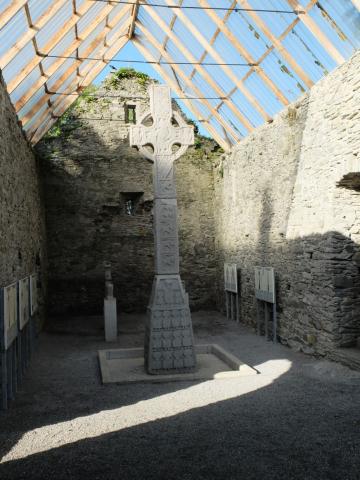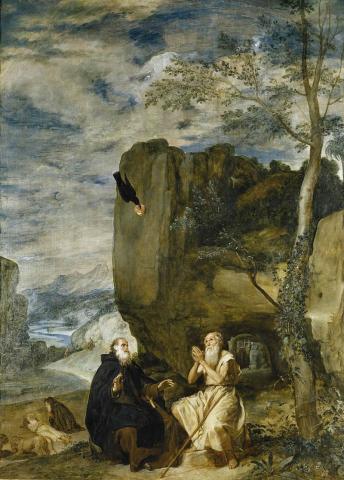[1] Sānctus vērō Brendānus cum suīs commīlitōnibus nāvigāvit contrā merīdiānam plāgam, glōrificāns Deum in omnibus. [2] Tertiā vērō diē appāruit illīs quaedam īnsula parva, contrā merīdiem procul. [3] Cum autem frātrēs coepissent nāvigāre ācrius et appropinquāssent praedictae īnsulae, ait illīs sānctus Brendānus: [4] “Virī frātrēs, nōlīte suprā modum corpora vestra fatīgāre: satis enim habētis labōrem. [5] Septem iam annī sunt postquam ēgressī sumus dē nostrā patriā usque in hoc Pascha quod ventūrum erit cito. [6] Namque modo vidēbitis Paulum heremitam spīritālem, in hāc īnsulā sine ūllō vīctū corporālī commorantem per sexāgintā annōs: [7] nam trīgintā annōs anteā sūmpsit cibum ā quādam bēstiā per praedictōs annōs.
notes
Paul, the Irish hermit. Sailing south, the monks see a small island in the distance and hurry towards it. Brendan tells them to relax, since they are now in their seventh year of the voyage. They will meet a hermit named Paul, who has lived on the island for 60 years without food, and who previously lived for 30 years on food brought to him by an animal.
This Irish Paul is clearly modelled on Paul of Thebes (in Egypt), also known as Paul the Hermit (died c. 340), traditionally regarded as the first Christian hermit; the Life of St. Paul of Thebes by Jerome is an important intertext for this chapter, which is particularly rich in Christian symbolism.
[2] Tertia vērō diē: the language reflects the Nicene Creed, et resurrexit tertia die.
[3] nāvigāre ācrius: “to row harder.”
praedictae īnsulae: dative. CL would normally be ad praedictam īnsulam.
[4] suprā modum: "beyond the limit"; "too much."
[5] Septem iam annī sunt postquam ēgressī sumus dē nostrā patriā: that the voyage of seven years is almost at an end.
usque in hōc Pascha: i.e., “up to the time of this (coming) Easter.” Brendan is speaking loosely, since they are only at the beginning of Lent (27.1).
sine ūllō vīctū corporālī: explained below at 26.42–43.
[6] modo: "in just a little while, soon."
[7] iam trīgintā annōs anteā sūmpsit cibum: explained at 26.39.
per praedictōs annōs: "during those aforemntioned years," i.e. the thirty years just mentioned, apparently underscoring their importance.
vocabulary
|
commīlitō –ōnis m. |
a comrade, fellow-soldier1 |
|
nāvigō nāvigāre nāvigāvī nāvigātus |
to go by ship, sail; to row |
|
contrā |
against; towards, in the direction of (OLD 14a) |
|
merīdiānus –a –um |
southern (OLD 2) |
|
plaga –ae f. |
open expanse, tract; region |
|
glōrificiō –āre |
to glorify; worship |
|
contrā |
against; towards, in the direction of (OLD 14a)2 |
|
merīdiēs merīdiēī m. |
noon; the south |
|
nāvigō nāvigāre nāvigāvī nāvigātus |
to go by ship, sail; to row3 |
|
appropinquō appropinquāre appropinquavī |
to approach, draw near |
|
praedīcō praedīcere praedīxī praedictus |
to say beforehand; mention |
|
fatīgō fatīgāre fatīgāvī fatīgātus |
to tire, wear out4 |
|
septem; septimus –a –um |
7; 7th5 |
|
ūsque |
until (often with ad or dum) |
|
pascha –ae f. |
Easter (LL) |
|
cito citius (comp.) citissime (superl.) |
quickly |
|
namque |
for in fact6 |
|
modo |
only, just; now, just now (at the present time); just now (in the immediate future) (OLD 5b) |
|
Paulus –ī m. |
Paulus |
|
herēmīta –ae m. |
a hermit |
|
spīritālis –e |
spiritual, sacred, religious |
|
vīctus vīctūs m. |
food |
|
corporālis –e |
corporeal, pertaining to the body |
|
commoror commorārī commorātus |
to linger, stay, live (in a place) |
|
per |
through; by means of (OLD 14) |
|
sexāgintā; sexāgēsimus –a –um |
60, 60th |
|
trīgintā; trīcēsimus or |
30; 30th7 |
|
anteā |
before, formerly |
|
bestia –ae f. |
beast, creature |
|
per |
through; by means of (OLD 14) |
|
praedīcō praedīcere praedīxī praedictus |
to say beforehand; mention |


